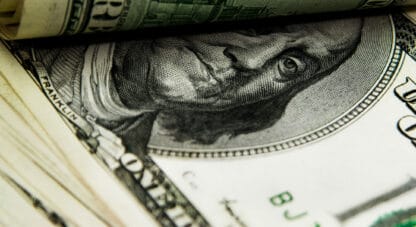About this week’s show:
- Who is richer than John D. Rockefeller?
- Infinite printing feeds infinite desire for power
- Income inequality sponsored by your government
- Be sure to watch, What is Real Money? CLICK HERE
The McAlvany Weekly Commentary
with David McAlvany and Kevin Orrick
Kevin:This year we have a video, finally David, that is the primer that we have been asking for for years. A lot of our listeners have gold and silver, and they utilize the triangle as the way that they invest their money. But they have kids, and they have family members, and they have friends, who really don’t understand at all why they do what they do.
David:We have been in the precious metals business for more than four decades, and we are one of the largest in the country doing what we do, what we’ve found lacking, in both the things that we have produced and others in the industry have produced, is the basic question: Why do you own gold? What is the purpose served? And the title of this year’s DVD is: “What is real money?”
Kevin:That’s as basic as it gets.
David:It is an educational piece on the corruptions of sound money through time, and we look at hundreds, we look at even thousands of years, and how consistently man has attempted to build an ideal system. As consistent as that process has been, and repeated as that effort has been, so have been the failures of each of those monetary systems.
So we would point out this one thing: You need a relationship to something real in order for a monetary system to remain stable. When you move away from that tangible relationship, that is when all kinds of problems develop, in a massive increase in debt, a massive amount of money-printing, a massive amount of inflation, a massive amount of currency disruption. We export something to the rest of the world which is inherently destabilizing. Do you know what that one factor is? The dollar. The dollar is the destabilizing force. And it wasn’t that way originally. This is the irony. We brought about a great degree of stability in the world monetary system after World War I, but again, that slippage, the temptation to build a better mousetrap. At the end of Bretton Woods, the monetary agreement we had from 1944 until about 1971.
Kevin:There was a promise that the dollar was a receipt for gold. The dollar wasn’t just a piece of currency or a piece of paper. It was a receipt that you could actually redeem for gold.
David:Its legitimacy was tied to something non-system oriented, and something that had universal appeal.
Kevin:But you’ve mentioned slippage. We have slipped. Just look at the beginning of the Federal Reserve, which is really there to print money. How much have we slipped in buying power just in the last 100 years?
David:100 years? We founded, in 1913, the Federal Reserve system, the third of our central banks. We allowed the other two, because of unbelievable, very clear observations by many of our founding fathers to say, “Hey, wait a minute. This is how you corner the market in finance.”
Kevin:They didn’t want to go the same route as the Bank of England had gone.
David:No, in modern vernacular, many have called the banking community “banksters.” That’s not inaccurate if you go back to the first central bank, and the second central bank, and again, we allowed their mandates to expire, and for them to simply slip into history. 1913 created, again, the next context, our current context. This is where slippage … this is when politicians figure out that the money system can be abused to the advantage of the political elite. Slippage is sort of a creative way of describing the gradual loss of purchasing power. This has been well recognized by those in the field of political economy. There is a very quiet way that you increase taxes and enable a political system to grow beyond its natural limits and that is, via the money system.
Kevin:So if you were to take a 1913 dollar and convert that into what it buys today, Dave, what does a 1913 dollar buy today with the slippage?
David:Kevin, I would say something along the lines of a gumball, except that most gumballs cost a quarter instead of a nickel, and actually, it won’t even buy a nickel’s worth of bubble gum today.
Kevin:So you are saying we’ve lost 95%, 96%, 97% of our buying power.
David:That’s right. The film this year covers what we consider the basics. For many of our Weekly Commentary listeners this is a review of the basics, a gold primer, if you will. My suggestion is you look at it as a primer, not for yourself, because you may already be familiar with these issues, but as a primer for friends, as a primer for family members and colleagues who have never quite gotten it. And if you know anyone who has an overly confident view in our current financial system, in our monetary system, or a naïve understanding of how our monetary system works, whether that is our fractional reserve banking system, our fiat monetary system, or even the high degree of leverage and radical expansion created by Wall Street financial products over the last several decades. If you know anyone who is in this position, this is a tool, this is an essential tool for you to pass along to them.
Kevin:Well, and history is such an important thing to know. We can go back and talk about economic and political history until we are blue in the face, but sometimes you just have to put it in a simple format where you say, “Look, this is a repeating pattern. It wasn’t without thought and a long series of trial and errors that we were on a gold standard. When governments come to a gold standard, usually, it is because of pain that was experienced beforehand.
David:Now is the time for these folks to wake up. There is a very critical period, and I would suggest the next 6-12 months, that people, if they have not gotten their houses in order, financially speaking, must do so. And if they don’t, what they are jeopardizing is a generation’s worth of savings, because what we are now up against is sort of the last efforts of a welfare state which is having a hard time financing itself today. It is moving into that last desperate gasp of survival, and I think this is where we see, yes, ultimately the wheels come off in the financial system, but not without a significant fight by our central banks to maintain the status quo, and I say central banks, because it is not just the U.S. Fed, it is also the European Central Bank, it is also the Central Bank in the U.K., directed by Mark Carney, it is the folks in Japan, it is folks all around the world who have done the same thing that we have since 1971.
Kevin:And David, this is the first time in history that the entire world has been on a fiat, or paper currency system, so if the experiment didn’t work before, country by country, how in the world will it work for the entire world. I think we should also mention right now, early on in the show, for listeners who want to go ahead and see this video, that they can find it at mcalvany.com. Just go there, you can click on it. There is also a YouTube channel. It is McAlvany Financial YouTube. You can get there either way. Go to mcalvany.com or McAlvany Financial, and that’s YouTube, and we would encourage our listeners not only to watch the video, but if you like it, to actually send it to others, maybe even put “Like” on there, if you like the video, or put a comment, whether you like it or not.
David:What I’m personally asking you to do, as a listener, is just what Kevin mentioned: View it, and forward it on to your friends, your family members, your colleagues. I am asking you to do that because I think the content is foundational enough to an understanding of, not only sound stewardship and money management, but something even more basic. Again, what is real money? We’re playing games with this fragmented view of financial reality, and this, I think, cuts to the chase of what it has been by necessity for 5,000 years, and just how radical the experiments are that we have in play today, and yet, we take for granted how radical they are because we don’t know, we don’t have the right context.
Kevin:And this video does not leave you helpless. This is a video that actually has point after point after point, things people can do, so let’s go to why there has to be a video in the first place, though, Dave. We have these crises that come up and we have these needs, these political reasons, and sometimes social reasons, why the government steps in and does something that is unnatural and actually unsustainable. They are sort of substitutes for the real thing, aren’t they?
David:When new substitutes are introduced, on the surface there are usually reasons and justifications. We saw that back in 1922 when there was a meeting in Genoa amongst central bankers and they decided that they could substitute the U.S. dollar and pound sterling, this is the paper versions of those currencies, as a reserve asset, in addition to gold.
Kevin:And their justification was that we had just ended the “war to end all wars” and there was too much debt. And there was, frankly, a lot of expense put toward moving gold from one storage location to the other, as you were seeing foreign accounts put back in balance, and so it was just easier to shift paper than it was the real thing. But in the end, we see human nature peeking through. There is the desire for control and power and it infects the paper money systems and those systems end up serving the pet projects and the political devices of politicians. And frankly, they are smart enough to influence the monetary mandarins of their day, as they do today. We have politicians today that pressure the Fed to act in such a way to improve employment, to make sure that the market does not collapse. Why? Because all of these things are issues which are sensitive to their constituents and to the degree that they don’t control the economic variables in a top-down fashion, what you end up with is bottom-up revolutions.
Kevin:Right. And you know, this is nothing new. We are talking about fiat currencies right now, which is almost like being able to print your own gold. This was the dream of alchemy, to be able to create gold from lead. And what we’ve really learned is that they’ve created gold, but it’s in the form of paper, and it doesn’t last forever, but at least for a while, it seems to feed their lust for power.
David:It does, and I think political scientists have long observed that the power of the purse is really the alpha and omega of politics. We have the infinite printing which feeds the desire for infinite power, and you have the printing presses of our day, which print, again, money out of nothing, and it feeds a financial system like gasoline feeds a fire, but what you are really talking about is exaggerating and accelerating a natural process. It sucks growth from the future into the present. What politician doesn’t enjoy taking credit for present growth statistics, knowing that future politicians will have to pick up the pieces and/or cover over the consequences of shifting growth from one generation to the other, leaving future generations sort of abandoned and destitute.
Kevin:Well, okay, let’s take the side of the politician, as painful as this is for you, Dave. This is a guy, and maybe he does understand that what he is doing is wrong in the long-run, but he also has to get re-elected. I think of Reagan back in the 1980s. Reagan saw that it was his administration that ultimately would put the cold war behind us. He saw that momentum, he saw what he was doing, but he also realized that we were in a recession in 1983 and so the decision was made to go ahead and triple the U.S. debt from 1 trillion to 3 trillion, on the backs, at that time, of the Japanese. But it was a decision that I think Reagan understood had consequences that he really preferred not to have in the long run for the United States, but he still justified it. It’s like what you were saying before. Slippage, almost always, has a good justification at the time.
David:And it’s also intriguing that over the last 40-50 years, there has been less of an economic growth benefit from an increase in debt. You go back to the 1950s and 1960s, you could increase debt by one dollar, and on the other side of the equation, see as much as four or five dollars’ worth of economic growth. Now, we’ve gone a long way, and that includes the increases in debt we got from Reagan, but in this cycle from the 1950s, 1960s, to the present, now increasing our debt by a dollar gives us right around eight cents’ worth of growth.
Kevin:Oh my. Well, see that just shows you why we are going backward.
David:We are in a situation where we are going backward, and you could have argued in an earlier time frame that a little bit of debt did increase your economic growth. We have gotten to the point of critical mass now, where the total stock of debt is unsustainable. It’s unsustainable. And that’s one of the reasons why we look at the abuse in the fiat or paper money system today as the only means that we can extricate ourselves from a very, very awkward situation. We have an intergenerational debt burden. We have a liability structure which will bankrupt the future unless we can alleviate the pressure of that debt via the printing press, in other words, we pay it off with cheaper and cheaper dollars.
Now, who is that to the detriment of, and who does it benefit? Well, it benefits the debtor. And it detracts from the saver. Because, essentially, what you are doing in the context of inflation and creating money out of nothing to pay off an existing liability, an existing debt obligation is that you are allowing for the benefits of inflation, again, to accrue to the debtor, someone who has not necessarily been responsible financially, and on the other hand, the saver is fully exposed to the declining purchasing power of the dollar as a consequence of that inflation, so it is the worst of both worlds in terms of tearing apart a saving, or fiscally responsible segment in society, where it rewards bad behavior on the other.
Kevin:And what it does is, it sucks the life out of the saver. I remember a movie that was out 25-30 years ago called Dark Crystal. I don’t know if you ever remember seeing that, but these evil beings would actually connect to people and suck the life out of them, just drip by drip by drip, and they would just shrivel up. I think about what that does to the middle class. That’s really what inflation does to the middle class, Dave, it sucks it out.
With that being said, this video goes through just some basics, because, again, we don’t want people to listen to this show or look at the news and walk away deflated. You have a passion for education, you have a passion for legacy, as far as teaching the next generation down how to protect themselves from these types of things. So let’s just talk about what are some of the things that you have on the video that teach what they need to know about gold.
David:And I think this is where it is a very useful tool for folks to pass on to friends, family members, colleagues, their children, their grandchildren, to say, “Listen, you need to understand something about the history of gold. You need to understand the role that it has played through the generations, and why. Human nature, frankly, has not changed much in 5,000 years, and why we continue to make the same mistakes over and over again, be that political mistakes, be that economic and fiscal mistakes. These are issues which you see, and the beauty is, gold is like a thread that weaves its way through the historical tapestry, and lets you know who and what was significant in terms of power, politics, decisions being made, and ultimately, the implications of those decisions, which were either of benefit to society, or to the detriment of society. The history is really important.
Kevin:The history is very, very important, and I know people watch the price these days, sometimes too much. But supply and demand, just simple supply and demand economics is playing a critical role right now in gold. Because the price, this last year, Dave, and we’ve talked about this a number of times, has not really shown what the true demand is. I mean, China just devoured everything that wasn’t nailed down.
David:So we do look at the fundamentals, we look at the present tense supply and demand fundamentals, of course, tying in where we have come from and I think where we are going, but the present supply and demand fundamentals, like any investment, if you have 100 homes in a neighborhood for sale and only one buyer, guess what? You can expect there to be sort of softness in price, a decline in price. But if you’ve got 100 buyers and only one home in a neighborhood for sale, it’s the opposite dynamic. So what are the supply and demand dynamics in the gold market today? Who are the constituents? Who, in terms of the geography, who is participating today, who was participating, who do we anticipate participating in the future? Again, if you want to understand how this market operates, it is very important to look at the fundamental building blocks.
Kevin:One of the questions we get, and people don’t normally think this way about buying gold. The average person out there who has a mutual fund or a stock portfolio is not thinking, necessarily, about owning physical gold, and so one of the things I really like, Dave, that you’ve brought out in the video is just the various vehicles that enable the investor to participate. There is physical gold, but there are ETFs, there are other types of things, and a person needs to understand what works best for them.
David:There are about ten different ways you can approach the market, and the question is: What are you trying to accomplish?
Kevin:That’s the strategy part.
David:Right. So you could accomplish what you want via the stock market. You could accomplish what you want via mutual funds, via exchange traded funds, ETFs, via other derivative products like futures and options. The question remains, what are you trying to accomplish? We settle on physical metals for one particular reason. There is very little fuzz attached to physical metal ownership. It puts you in the power position. And this is what you need to recognize throughout history, power is being stripped from the individual and given to the state, and what we want to reclaim is power back to the individual. Dignity, respect, empowerment, in the economy, and in the decision-making process, the future planning, the instantiation of their hopes and dreams in the world. They get to put that in motion with the empowerment of reserve assets. But guess what? They control, not that someone else controls, not that can be rehypothecated, not that are somehow removed because COMEX or NYMEX says they are removed or not available for delivery. There is so much fuzz that you can attach to any of those other options, and that is not to say they’re bad options, but you have to decide why you own what you own, and are you willing to have additional layers of variable risk involved.
Kevin:And you also brought out the fact that gold maintains its buying power. That is its first and primary purpose for owning physical gold. Like the example you give on housing. The average house for the last 100 years, actually, probably even longer than that, has been worth about 200 ounces of gold, right?
David:Right, you look at the 1930s, you look at right now, and there is some variance in between, but on average, a single-family home in America costs you about 200 ounces of gold. It did in the 1930s and it does today. The fact that that single-family home has gone from $4,000 to $235,000 is the great deception of fiat money. You feel richer because you own a home worth $235,000. But you have been conned into believing that fiat money represents real wealth. This is the great con of our generation of the last 100 years. But guess what? It is the great con which has been foisted on the public, not just for 100 years, but for 5,000 years, and it’s why people return to what is tested, through time, as real money.
Kevin:David, what we were talking about before as far as sucking the life out of the middle class, there really is income inequality. We are seeing different factions talking about income inequality. It’s not Republican or Democrat, and this is an issue where we are starting to see very, very wealthy people who dominate almost all the wealth of the world. What was the figure that the top 80 or 80 some-odd people who were the wealthiest in the world actually own more than half of the world’s money?
David:Again, this goes back to my last point. You feel like the dollars today are bigger, and therefore we are better off. You realize that no one yet today has surpassed the wealth of John D. Rockefeller. Look at Carlos Slim, he was just displaced this week by Bill Gates. But still, we look at their tens of billions and we’re impressed, but remember that these are inflated dollars, and if you go back in time, Malcolm Gladwell talks about this in one of his books, Outliers, where you say, “Wow, is that even possible?” That’s just the way it rolls. If you understand what real money is, and if you understand what has happened in the context of our fiat currency system, this is how all reality is distorted and redefined. Curiously, the current administration has made rather a big to-do about income inequality, and obviously, that is not new from a Democratic administration, we’ve heard that over and over again.
Kevin:But look at Teddy Roosevelt.
David:Right. Under the Republican banner he went on sort of a related, not exactly identical, but a related crusade when he was busting up monopoly trusts. And there have been other periods of income inequality in history, each with its very unique backdrop, and this particular one, the one that we’re living in now, this era’s income inequality, this issue has a special background, as well.
Kevin:And this sometimes makes Republicans very, very uncomfortable, because we look at how liberals, a lot of times, will talk about income inequality, and you can just see a political motive behind it. But actually, when the Republicans, because they’ve been trained to never challenge business, they put down income inequality, they’re missing the point that something is actually creating this, and it does exist.
David:Right, you mention that, and I think it’s interesting, conservatives can’t bring themselves to be critical of wealth in any way, nor can they level a criticism against business, whether it is big business, or little business, and it is almost like a secret Republican credo: “Thou shalt not criticize thine own.” And the left, of course, meanwhile, sees classic haves and have-nots, in that equation where those with resources are to blame for those who don’t have the same resources, and so, of course, the redistribution process from one group to another is somehow, therefore, morally justifiable. Roosevelt was perhaps a little different. He obviously didn’t like child labor, and he saw that big business rather fancied no competition whatsoever.
Kevin:And you’re talking about Teddy Roosevelt.
David:Exactly. And so politicians in that era could also do the math and see that the entire political system was going on sale to the highest bidder. I think that’s one of the things that Roosevelt was looking at and basically saying, if you have more money than Midas, you can buy the system. You can absolutely buy it, lock, stock, and barrel.
Kevin:It seems that that is still happening today, though, Dave. If you really look at where government money goes, it’s really not that many corporations at all.
David:No, you’re right. Out of the thousands of companies that exist out there in the United States, 200 companies received 560 billion dollars in annual income for services and goods they deliver to the U.S. government.
Kevin:This sounds like corporatism, just like what Mussolini said fascism was, it is just corporatism.
David:Yes, and I don’t think that’s particularly healthy for the body politic. We tend to look at these things through a variety of lenses, political, economic, geopolitical, and what have you, but the most practical one for this issue, I think, is to see what elements are sort of universal under the law. When you look at sort of what is fair, if this is a question of inequality and rich versus poor, what opportunities are either limited or wide open under the law, and we do, still in the United States, have the opportunity to take risk, and to seek to grow enterprise, to start something from nothing, and to work. Creativity and hard work, Kevin, these are not socioeconomic class distinctions. These are character qualities that can be universal in nature, but there is really no longer a requirement to be, like we used to have, a landowner in order to vote, or some sort of class structure which precludes rising in the ranks. We’re past sort of the Downton Abbey stage of the modern society.
Kevin:Okay, so if we are looking at that, we do have the most creative environment in the world, as far as entrepreneurship. But we’re slipping on that. What is causing income inequality. If we have entrepreneurship, and we have this creativity, why do we have this gap in the middle?
David:The gap is greater today, even going back to the robber baron days. What is the element making the rich richer and the poor poorer? The printing press. Here is the basic issue of income and wealth disparity in our era, and here is how it works: Those with assets receive the benefit of asset inflation via inflation targeting. In other words, you own something real, but the Fed is intentionally trying to create inflation. They are trying to create inflation, which above and beyond sales growth, or capturing market share, or things that normally drive the increase in value of an asset, the inflation is adding an artificial growth rate to the valuation of those assets.
Kevin:And they have told us that that is healthy. I remember in economics classes, Dave, where they said a little bit of inflation is really good for the economy.
David:Right. And right now you have a number of Fed members that are suggesting we lift the current target because they are so deeply afraid of a deflationary spiral. What is the current target? 2% is the stated inflation goal. Every year the dollar should lose 2%, to the benefit of the economy. Think about that. As a layman, a nonprofessional economist, how does that strike you? We’re going to destroy the value… this is sort of death by a thousand cuts, but you’re going to bleed out so little at 2% a year, it doesn’t really matter, because guess what you are getting on the other side? A healthy economy.
Kevin:It’s like going to Home Depot. You can get those orange 5-gallon buckets, and “Well, would you like one that holds all the water, or how about one that loses 2% a year?”
David:“These are small holes, but you should be able to keep up with it, as long as you continue filling.” Well, okay, so here’s the issue. The wealthy don’t spend all their income. So what do they do? They routinely buy assets with the remainder and those assets benefit from this unnatural growth in value. Meanwhile you have the poor and middle class who generally spend all their income. With very little in savings, there is very little left over to invest, and very little, which therefore sort of rises with the tide of inflation. What that is describing is the upward boost. You have the upward trajectory of those who have the ability to buy assets and see them appreciate. Hopefully everyone’s assets, if they own them, appreciate. But what we’re really talking about is the artificial boost that you’re getting from inflation, which helps those assets grow at an even more aggressive rate.
Kevin:So the person who is having to actually just spend their paycheck on their bills, they’re getting less and less, month by month, for what they make.
David:Right, so we just finished talking about the upward boost in terms of asset prices. Then you have the critical downward pressure on the middle and lower classes, which is the result of money-printing, and this is how that works. Your real, inflation-adjusted income has not only been stagnant. Well, I guess that’s health enough, we should just say it has been stagnant for the last 40 years. But you had a growth trend, from 1947 to 1973 median household income was growing at 2.1% per year, and now, from 1973 forward, that trend has been less than 1/10th of 1%.
Kevin:So it’s not keeping up with the fall of the dollar, basically.
David:It’s not keeping up with the stated rate of inflation, certainly. And again, this is where, with stagnant inflation, or declining income in real terms, wait a minute. We just said it goes back to the early 1970s. Trivia question: What changed in our monetary system in the early 1970s?
Kevin:Well, you know, I guess it was Nixon closing the gold window. The dollar is no longer on the gold standard.
David:The dollar was no longer a receipt for physical gold, that’s exactly right. So, your 1971 disconnect, where you change the monetary system, all of a sudden changes the economy as we know it, and changes the income and asset growth trajectory for the middle class and lower class in our country. Instead of being able to keep up and improve their life, now we find this bifurcation between the rich getting richer and the poor getting poorer. Why? Because it takes every last cent to pay for the bag of groceries, the tank of gas, and Johnny’s school clothes.
Kevin:I want go back, we were talking about the history of gold a little bit, Dave, but I think it’s important to look at the history of your family. When Nixon closed the gold window in August of 1971, your dad was a stock broker, stock and bond, and he saw that, and both your dad and mom agreed, “We need to buy some gold.” But knowing your dad, and you know your dad very, very well, he doesn’t just do something himself. He spreads like a contagion.
David:(laughter).
Kevin:If he’s doing something, he tells everybody what he’s doing.
David:“You need to do this, too.”
Kevin:And really, he was right, though. It’s sad. Isn’t it sad that we actually have to sell gold to people who trade paper currency for gold. We shouldn’t have to do that because the paper currency should be backed by the stuff.
David:Well, and that is the point. The bottom line of this year’s DVD is that you have to put yourself on your own personal gold standard, up until the time when, from a policy perspective, we return to something which is responsible. And up until that date, you are responsible, in terms of a stewardship of family wealth, to ensure that fiat money, the system which is hell-bent on destroying your purchasing power, does not take you down the tubes with it.
Again, this does not have to be the case. From the 1860s until about 1922… well, you could say 1914, but technically 1922 when we went on the gold exchange standard, we had a system where you could trust your savings.
Kevin:You didn’t need to buy gold, because it was already in your currency.
David:And if you had greenbacks, they were a receipt for gold, which, again, in a one-to-one relationship, ensured that you were not being taken advantage of by politicians and banksters. That’s not the case today. So we have this situation. It’s a tough situation, wherein not only do assets inflate, the higher prices, but you also have the inflation of the basic necessities of life. So via the central bank printing presses, we end up with stagnant real wages buying less and less of the basic necessities of life, and requiring all, or nearly all of an income, just to make ends meet, even requiring, today, a dual income to earn what once could have been provided for on a single income. Think about that. Two gals from Harvard University wrote a book on that, maybe 6-7 years ago.
But yes, you have dual income, which is now required, in what could have been a single-income family. I am not saying that women don’t feel dignified in the process of seeking work, but they should know that the equation has changed, the math has changed such that more and more women must work. It’s not just an issue of equality and choice, it’s an issue of necessity, driven by central bank money-printing, and the knock-on effects, in the real world, of what it takes now to manage a household and stay above water.
Kevin:Really, what you are saying is, there’s nothing wrong with the growth of assets, that’s a natural pattern, even in a gold exchange or a gold standard system, you are going to have assets rise and fall. You are going to have booms and busts, maybe minor booms and busts, but in this case, they rise higher, and they have to fall further, because you have this inflation, you call it an accelerant.
David:Schumpeter had this idea of creative destruction. It’s not like everything always grows, but when you come across a bad business plan, or a bad idea, or banks over-lend in a period where they should be sort of tightening their belts, what you end up with is failure, and a contraction in the business cycle.
Kevin:That’s a healthy consequence, actually, for the overall economy.
David:It is, and so there are periods of decline, but there are these periods of growth where you can have a healthy expectation that assets will appreciate in value, not that all trees grow to the moon. That can’t be the case, it never will be, it’s unnatural. You do have ebbs and flows in the business cycle. But what we are really talking about is the difference between normal compound interest, sort of following the rule of 72 and what you would expect of savings and investment growth, with that accelerant in the equation. The accelerant in the equation is when you add 2%, 4%, 8% inflation, and the nominal value of assets increases well beyond the rate at which companies can grow their sales, or if you want to think about real estate, real estate appreciates given the normal supply and demand dynamics.
So we’ve had sort of the super growth cycle of the 1980s and 1990s, which was growing for a lot of good reasons, but there was also this exaggerated exponential growth in debt and the exponential growth in our world of monetary aggregates, which again has sort of set the bar so high, everyone now expects the growth of the 1980as and 1990s as normal, when in fact, it is the consequence of inflation, it is a consequence of massive debt expansion, it is the consequence of about 3 bad variables for the 2 or 3 that are also healthy and normal, also in the mix.
Kevin:Have you noticed, too, the people who would actually blame the Federal Reserve for this printing of money, like you said? They never get elected, Dave, they platform on those things, I’m thinking of Ron Paul, I’m thinking of some of these guys who actually see the problem for what it is, they never get elected. We know Ron, we’ve interviewed him, and he’s not going to get elected.
David:No politician really wants to consider our central bank and their monetary policies as the cause of income and wealth disparities because they also recognize that being able to continually over-promise depends on the printing press!
(laughter)
Kevin:Right, and that’s if they get re-elected.
David:No, if you lose access to easy money, buying votes becomes a lot harder. This is sort of the dark side of democracy, politicians have a huge stake in today’s status quo. Regardless of the rhetoric you get from the left, real structural change is not on the table because it would upset vested interests and disorient voting blocks that really, quite frankly, expect their bread to be buttered.
Kevin:Well, and it’s not just us, in our own country, saying this. When we talked to Dabrowski last week, he said the exact same thing. He said, “Look, until there is structural change, it’s going to look pretty grim.”
David:And we’ve mentioned many times before, the Fed, the Wall Street establishment, they are only too content to allow inflation statistics to be managed, massaged, tell a story which is convenient for their purposes, but does not really reflect what people experience. I’m going to call it checkbook reality. Checkbook reality and CPI inflation reality are two very different things. And moms and pops out there would say, “Yeah, I just don’t buy it, that inflation is less than 2%.”
Kevin:Well, you overstate the growth, you understate the inflation, we’ve talked about that. That’s just politics 101. Now, Ron Paul did come out, to his credit, last year and said, “You know, there is a simple solution, it sounds painful. When you read in the Bible where it says, “Gouge your eye out if it causes you to sin.” That’s what this sounds like to most Americans. But he said, “Go ahead and gouge the Fed out. Let’s just go ahead and get rid of the Federal Reserve.”
David:If you wanted to eliminate wealth disparities, those of our day, without playing Robin Hood, which is kind of the solution of the political left, you could either end the Fed, or perhaps less radical, you could severely curtail their operations. You have inflation targeting, you have discretionary policy implementation, and I think, generations from now, we will look back at the major social and political changes that have occurred as a consequence of the Fed’s free-wheeling behavior, and say, “Why didn’t you see this? Why didn’t you connect the dots?”
And it will, it will go back to that issue of voluntary blindness. Politicians don’t want to consider the issue that our monetary policies are creating income and wealth disparities, ultimately will create social disruption, in a haves/have-nots environment, they don’t want to point the finger there because it is what promises political legacy. They’re banking on it. Our political elite today are banking on easy money policies enabling them to continue to offer, offer, offer, with the bill being passed on to the next generation.
Kevin:Well, and it does not seem likely that we’re going to get rid of the Fed. It does not seem likely that anytime soon we are going to curtail them. It does not seem likely, Dave, that we’re going to go back to a national, or even worldwide, gold standard. So this takes me back to the video originally, because you have said, “If it’s not going to happen nationally, then it has to happen personally, and so what are some of the things you want people to do with this video, in conclusion?
David:What is real money? It’s a primer for your friends, it’s a primer for your family, to understand the context that we are in today, and to piece together a little bit of why, if you understand something about human nature, gold has returned to the forefront after each failed attempt at some other paper money system. This is the Chinese 4,000-5,000 years ago, experimenting with a paper currency and finding that it failed. There has yet to be a single fiat money system that has survived. Everyone has failed.
Kevin:It is interesting that it is China, now, who saw the failure early, early on, thousands of years ago, it’s China right now that is putting themselves back on a gold standard, so to speak, but the amount that they are buying.
David:So I would challenge one thing that you said a few moments ago. We may have a global monetary reset. We may have rationality re-emerge, and a populist outcry for, “We don’t want to be taken advantage of, we don’t trust the banking system, and we certainly don’t trust our politicians. We want something that we can rely on. We want something that acts as an anchor to windward. We want something that disciplines the decision-making in Washington, in Tokyo, in every national capital around the world. So I would not underestimate the potential for a global monetary reset.
Kevin:Now, that would come after a lot of pain, probably.
David:I agree, I agree. And that was Dabrowski’s comment last week. Dabrowski basically said, we’re not going to see fundamental change without crisis. Now, the crisis that he was speaking of was the kind of crisis that in China, in the 1950s and 1960s, led to the deaths of tens of millions of people. It was only after that social experiment failed that Deng Xiaoping, in the 1970s, started introducing new reform ideas, and was able to get them done. When Dabrowski was talking about crisis, he was not talking about something as trivial as the stock market going down a few points.
Kevin:He was talking starvation and pain.
David:That’s right, that’s right. Where the constituency does not exist today to tolerate the painful transition to something new and something different. I do think that in the next 2 years, 3 years, 5 years, we could see a global monetary reset. And I think you go back to what history teaches you is a reliable anchor, a reliable source of stability for any monetary system, and I think that’s why you are already seeing this. We mentioned this two months ago, April of this year, University of California, Berkeley. They are putting on an executive program, for what? For young central bankers to learn how to use gold as a reserve asset. We are returning to something, and I don’t know how the money mandarins of our day are going to embrace it. But I can tell you, in the emerging markets they are very open to the idea. It’s in the developed world, Europe and the United States, primarily, where you see reticence to embrace gold again as a part of the monetary system.
So yes, we have financial market vulnerability. This needs to be addressed. If you have family members, if you have colleagues, if you have friends, if you children, who don’t understand the way money works, they need to watch this DVD. If they don’t understand financial market vulnerability and the fact that the derivatives market has grown in the last ten years from 100 trillion to over 1 quadrillion, and the implicit risk that we have in the financial system today is greater than at any point in world history, you need to understand what a personal gold standard looks like. And you need to get started today.
If you’ve already gotten started, you have the advantage of maturity in these matters, and what you need to do is convey this to the people that you care most about. Use this as a tool. Use this as your primer, to pass on to friends, family members, and colleagues. Make sure that they are adequately prepared for the times that lie ahead.
















